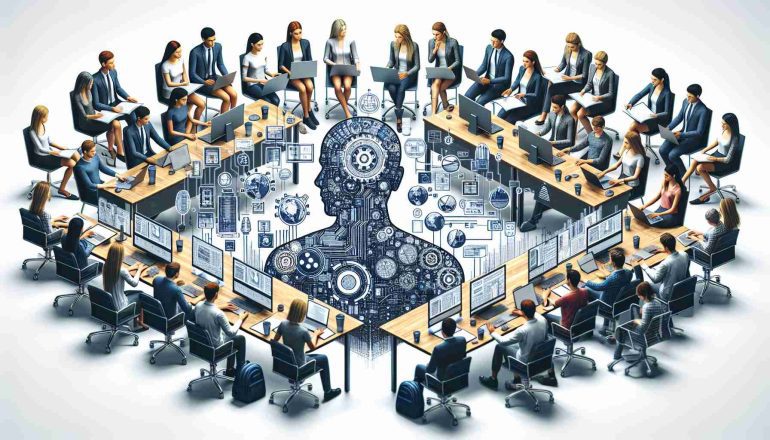- The event explored AI’s impact on employment, education, and digital inclusion.
- Discussions emphasized ethical concerns, including bias and privacy.
- AI offers potential benefits like increased efficiency and data-driven insights.
- Key challenges include job displacement and ethical risks, particularly in surveillance.
- Ensuring inclusivity and fairness in AI development is crucial.
- AI can either help alleviate or exacerbate social inequalities.
- There is a risk of dehumanization as AI replaces human roles.
Main AI News:
As the Manuel Fernández López ‘Lito’ International Summer School ended, participants engaged in critical discussions about the role of artificial intelligence (AI) in modern society. Organized by UGT and attended by influential figures like Minister of Inclusion, Social Security, and Migration, Elma Saiz, the event emphasized the pressing need to address AI’s social and ethical implications. Saiz highlighted the importance of ensuring that technological advancements benefit everyone, with a strong focus on inclusivity and fairness.
Throughout the event, participants explored AI’s impact on various sectors, such as employment, education, and digital inclusion. While AI holds immense potential to transform these areas, it also presents significant challenges. The discussions reflected a shared understanding that integrating AI into everyday life requires careful thought to manage its ethical and societal consequences.
As the summer school wrapped up, the emphasis shifted toward equipping participants with the knowledge and tools to navigate the rapidly evolving technological landscape. The event encouraged critical thinking about the future and stressed the importance of proactively addressing the challenges that AI introduces. Policymakers and leaders were called to develop frameworks that balance innovation with societal well-being.
Among the most pressing concerns raised during the discussions was the ethical integration of AI. AI systems, which often rely on large datasets for training, can carry inherent biases that lead to discriminatory outcomes, particularly for marginalized groups. Ensuring transparency and accountability in AI development was identified as a critical step toward mitigating these risks. Additionally, the increased use of AI in surveillance technologies sparked concerns about the balance between security and individual privacy, with many emphasizing the need to protect civil liberties as AI continues to grow in influence.
Another major focus of the event was AI’s impact on the job market. While AI can enhance efficiency and create new opportunities, it poses the risk of job displacement, particularly in sectors reliant on automation. Participants highlighted the importance of reskilling and educating the workforce to prepare for this shift, ensuring that workers are not left behind as industries evolve.
AI’s potential to alleviate or exacerbate social inequalities was also a significant theme. Developing AI technologies that prioritize inclusivity and fairness is crucial to ensuring that advancements are accessible to all, particularly underserved communities. The discussions stressed that AI must be used as a tool to foster greater social equity rather than deepen existing disparities.
The advantages of AI, particularly in terms of operational efficiency and data analytics, were widely acknowledged. AI’s ability to process vast amounts of data enables businesses and public services to make more informed, data-driven decisions. Additionally, AI-powered tools have the potential to significantly enhance accessibility for individuals with disabilities, offering new methods of communication and interaction that can create a more inclusive society.
However, the drawbacks of AI were equally emphasized. Job displacement, especially in low-skill sectors, is a significant concern, with participants urging policymakers to take proactive measures to address the socioeconomic impacts of automation. There were also discussions about the ethical dilemmas posed by AI, particularly in areas like facial recognition and policing, where the misuse of technology could have serious consequences.
Another concern was the growing reliance on AI and the risk of dehumanization. As AI takes on roles traditionally filled by humans, there is the potential for reduced social interaction and a diminished sense of connection between individuals. This shift could have far-reaching implications for both personal and professional relationships, raising importantquestions about the role of technology in human life.
As the event concluded, there was a consensus that proactive engagement from policymakers, educators, and technology developers is essential to shaping a future where AI serves the greater good. The discussions at the summer school underscored the need for an inclusive dialogue about AI’s development and application, ensuring that the benefits of technological advancement are shared equitably across society. Participants left the event with a renewed sense of responsibility, armed with the knowledge and critical thinking skills necessary to tackle the challenges posed by AI and to contribute to a more inclusive and ethical future shaped by technology.
Conclusion:
The discussions at the Manuel Fernández López ‘Lito’ International Summer School underscore that AI is set to play a transformative role across industries, affecting sectors from employment to public services. While AI offers considerable opportunities for increased efficiency, productivity, and innovation, it also brings challenges concerning ethical risks, job displacement, and social equity. For the market, this means that companies must navigate AI adoption carefully, ensuring that they not only leverage its advantages but also address the growing demand for ethical AI practices. Businesses must invest in reskilling programs to prepare the workforce for automation and develop policies prioritizing transparency, inclusivity, and accountability in AI applications. Those who balance innovation with responsibility will be best positioned to thrive in a future shaped by AI-driven technology.

